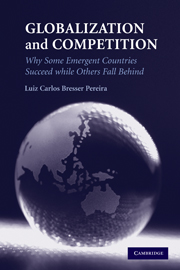Introduction
Published online by Cambridge University Press: 04 May 2010
Summary
In global capitalism, there is a myth that nation-states have lost autonomy and relevance. In reality, given the competition that characterizes globalization, nation-states have become less autonomous, but, as a trade-off, their role has become more strategic. On the other hand, while the conservative Right transformed globalization into a neoliberal ideology confirming the economic and cultural hegemony of the United States, left-wing militants viewed it as a manifestation of imperialism and as a major obstacle to economic growth. But both sides have been proved wrong, as several middle-income countries – particularly the dynamic Asian ones – have achieved fast rates of growth. This fact confirms the economic doctrine that middle-income countries that have already overcome the poverty trap can catch up because they can count on cheap labor and are able to copy or buy relatively cheap technology. Indeed, since the 1980s, these countries have experienced such impressive growth that it has come to be generally acknowledged that the economic center of the world is moving from the United States to Asia. In the 1990s, after the collapse of the Soviet Union, the United States appeared as the only hegemonic power and the growth engine of the world, but in the 2000s, this has proved no longer to be the case, as the impressive economic performance of the dynamic Asian countries has changed the world economic system. Yet a large number of emerging countries continue to record per capita economic growth rates inferior to those of the rich countries.
- Type
- Chapter
- Information
- Globalization and CompetitionWhy Some Emergent Countries Succeed while Others Fall Behind, pp. 1 - 16Publisher: Cambridge University PressPrint publication year: 2009

